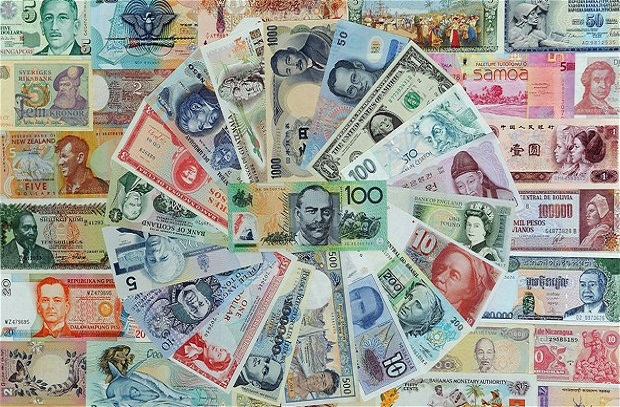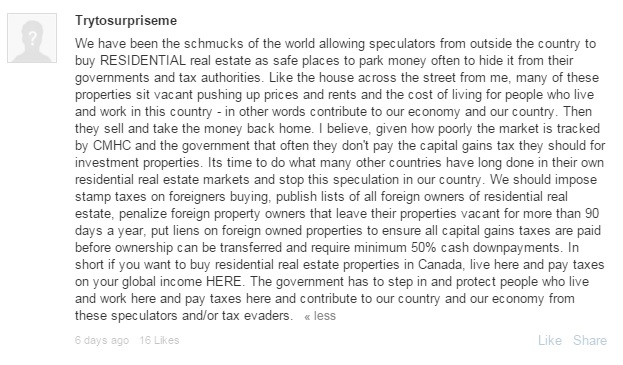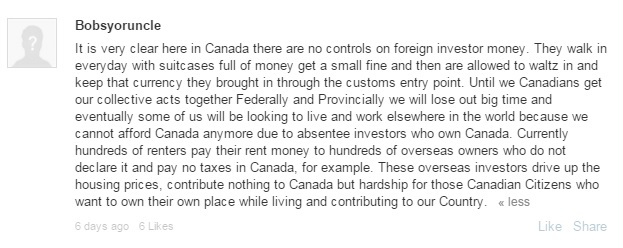“Foreign Investment” has become a buzz-term of sorts, and it often leads to an overblown conversation about a non-existent evil in our marketplace. Although, I suppose it depends on who’s talking…
In today’s blog, I want to discuss the idea of free-flowing capital between countries, and how this has helped boost the Canadian real estate market, but I’d be remiss if I didn’t examine the incredible disdain among the “average Canadian” for foreign ownership in our major cities.
I’m not one for reading anonymous online comments, but even still, the comments from last week’s CBC piece are eye-opening…

How do you feel about foreign ownership of Canadian real estate?
Did that question bore you? Or did it annoy you?
Did you sigh at the sight of another mention of “foreign ownership,” which is one of the most over-blown topics in real estate?
Or did you take a long inhale and grind your teeth at something that you think has been costing the average Canadian money for the last decade?
I read the Don Pitts column in last week’s CBC.ca, and my intention was to examine the subject matter of that article – the free flow of capital, and how it can affect our market, but perhaps the bigger story here is how Canadians feel about foreign ownership of “our” homes.
Sure, you might suggest that anonymous Internet readers’ comments are the lowest form of human communication, and can’t possibly be taken at face value.
But at what point to we read ten straight comments, all of the same opinion, and start to believe that perhaps there’s some merit to it?
First, let’s look at the article. Actually, it’s two articles I want to look at.
Two weeks ago, Mr. Pitts wrote this article:
“Global Capital Still Looking For A Canadian Home”
Here’s an excerpt:
–
A crisis in developing markets means there is some serious money on the move around the world. And despite the falling Canadian dollar, there are good reasons to think some of it is on its way here.
So far, new data shows house prices in Vancouver and Toronto are still hot, at least partly due to the interest of overseas buyers. Increasingly that money may be moving into things other than real estate.
At first glance, putting your money into loonies might seem like a bad idea.
For more than a decade the Canadian dollar has been identified as a petro-currency, and as the price of oil tumbled toward $30 US this week, the loonie has been falling too.
But neither that nor threats of rising interest rates and tighter mortgage rules seem to be slowing the flood of new cash into Vancouver and Toronto property.
One of the reasons could well have to do with something happening on the other side of the world. If so, expect more of it.
–
Mr. Pitts was writing about something we all know: that foreigners who fear for the safety of their own banks, equity markets, and currency, have been putting their money in “safe” Canadian real estate for quite some time.
And as the Chinese markets plunged to start 2016, it looks as though more and more Chinese Yuan will be converted into Canadian Dollars, and eventually into Canadian homes.
But then last week, Mr. Pitts followed up with this article:
“Chinese Controls On Capital Could Affect Canadian Property”
How is that for timing?
In the first line of the second article, Mr. Pitts even noted the coincidence, saying “I may have jumped the gun.”
So we go from talking about how Chinese money will continue to pour into Canada, driving the price of real estate higher, to talking about how capital controls could see less money coming into our country.
From the article:
–
On Friday the Shanghai correspondent for the Financial Times, Gabriel Wildau, reported that China is moving to step up capital controls in an effort to stem the flood of cash out of the country.
This week it will be interesting to see if other countries begin to follow suit, which could reduce the amount of cash seeking safety in the world’s developed countries.
–
One of the effects of the rush of money out of countries like China, Russia and those in South America has been a surge in developed-country real estate. If a trend toward currency controls develops suddenly, that growing flood of money could turn to a trickle.
That’s if the currency controls work. There are so many ways to move money now, including untraceable bitcoin transactions, that determined individuals can always find a way.
Without truly stringent restrictions that would interfere with trade, even a government determined to stop the flow will only be able to slow it.
–
If a country can enact currency controls, or better put: restrictions on the flow of currency, surely they could enact something like……oh…..I dunno….say…….restrictions on the purchase of real estate by foreign investors, could they not?
I know that these are two vastly different topics, and I’m making an effort to link the two.
But when reading the two articles on CBC.ca about the possibility of Chinese capital controls affecting our real estate market, I had the good fortune (or mistake…) of scrolling down to the comments section, and witnessing the absolute vitriol that people were spewing on the subject.
If I didn’t know better, I’d say that most people believe that real estate in Toronto and Vancouver is unaffordable because of foreign investment!
I know people are frustrated with the price of real estate, but what is it with our society’s constant need to find, and persecute, a “bad guy”?
Here’s a quick sample of the comments I read:








And so on, and so on.
90% of the comments were angry, and most of them were angry at foreigners for buying real estate in Canada, and Canadian politicians for allowing foreigners to buy real estate in Canada.
It seems as though Canadians firmly believe that “our” real estate is for “us” and that it somehow “should” be more affordable.
Some of the comments were outrageously racist, so I chose not to include those.
But I honestly didn’t see anything arguing the other side, such as:
“How many people have made half their wealth from the real estate boom?”
Or what about, “How many jobs have been created by the last two decades of construction and a climbing real estate market?”
It was just hate, hate, and more hate.
–
I guess the take-away from both the CBC articles, and from today’s blog, is this:
1) If China were to restrict bank withdrawals and the free-flow of capital, it could result in less foreign investment in Canadian real estate, on a very marginal level.
2) A lot of Canadians are really, really REALLY pissed about the price of real estate, and they are choosing to ignore free market economics.
Okay, wait. Both of those take-aways were soaked in my opinions.
Perhaps it’s not fair to say “they are choosing to ignore free market economics.”
But the notion that real estate “should” be more affordable has never flown with me, because a market of buyers and sellers ultimately determines the price. Whether those buyers and sellers live in Toronto or Hong Kong, is another story.
But I feel as though many people, most of whom don’t own real estate, or want to own bigger and better real estate, but can’t afford it, want there to be this identifiable and unlikable “bad guy” that they can blame for all their woes.
Wouldn’t it be so much easier to blame foreign investment, and a bunch of people who don’t look like us, speak like us, or act like us, than to blame low interest rates, an expanding population, society’s increasing stomach for debt, and under-priced Toronto/Vancouver market relative to the globe to begin with?
If our dollar continues to decline, mark my words – there will be FAR MORE foreign investment coming into Canada, and even if a country like China enacts currency controls, they’re only going to stop a fraction of that money from coming out…































Appraiser
at 7:54 am
Belief Perseverance:
Once we have decided that we believe something, we will tend to keep on believing it, even in the face of disconfirming evidence.
Particularly if other people know of our belief, it can be embarrassing to climb down from our previous assertions. It is also difficult to remove a belief which has been woven into a wider web of belief, without disturbing those other beliefs.
Appraiser
at 8:38 am
Speaking of CBC. Here’s an article that should get everyone thinking about what’s right and wrong with this planet: World’s richest 62 people own 50% of the wealth on earth.
fhttp://www.cbc.ca/news/world/richest-62-people-own-same-as-half-worlds-population-oxfam-davos-1.3408049
Marina
at 9:34 am
Blaming the nameless “foreign buyer” also distracts the public from some real issues, such as better infrastructure that would make suburbs a MUCH easier place to live and commute from and may ease some of the demand pressure in downtown. Maybe. I can’t speak for Vancouver, but in my residential area of Toronto, there are no empty family houses that I’m aware of. Next door, in the $5 million + neighborhood there are a bunch, but not here.
My neighbors and I do not want to commute from Milton, or Pickering, or Newmarket, thanks very much. So when a house goes on sale here, there is a line-up around the door.
Which is not to say foreign buyers don’t have an impact, but it’s not like without them suddenly every Tom, Dick and Harry will be able to afford Riverdale, Lawrence Park or Roncy.
That said, affordable housing is a real problem, but it will not be addressed by the removal of foreign investment. It needs longer term urban planning, better educational and employment planning to improve overall income level, and better infrastructure. But it’s easier to blame the foreigner.
Chris
at 10:53 am
“even if a country like China enacts currency controls, they’re only going to stop a fraction of that money from coming out…”
Looks more serious than that:
http://www.chinalawblog.com/2016/01/getting-money-out-of-china-what-the-heck-is-happening.html#disqus_thread
“Chinese citizens who are supposed to be allowed to send up to $50,000 a year out of China, pretty much no questions asked, are not getting that money sent. I feel like every realtor in the United States has called us on this one.”
Boris
at 11:53 am
As the Chinese struggle with their capitalist/communist Frankenstein economy, and their market continues to sell off, controls will get worse. Don’t forget the Yuan is being devalued as well, that is likely the only way out of their tenuous debt bubble – monetization of said debt. Which also reduces purchasing power. Which also makes people want to get capital out of the country, which closes the feedback loop.
Kyle
at 12:15 pm
Bears are such a conflicted bunch. They’ve convinced themselves that foreign buyers are making it unaffordable, but at the same time they will bring about the collapse which will make everything affordable. They can’t decide whether to love them or hate them.
It’s funny to watch them get into such a tizzy. You guys realize that foreign buyers have been part of Toronto’s real estate market, since the Europeans traded pelts for homesteads, right?
Paully
at 12:20 pm
No. It would have been York at that time.
Kyle
at 12:28 pm
Damn, you got me there.
Appraiser
at 12:45 pm
When the myriad crash theories never materialize and all else fails, place the race card.
Boris
at 1:21 pm
I’m not sure the quips David has posted above can accurately be described as bears…
Wut
at 1:53 pm
I can’t afford a home because of HAM or speculators, I can’t hold down a job because of immigrants or free trade, I can’t stay sober or lose weight because of chemicals or some disease, blah blah blah. We humans love excuses.
Bottom line is, we’re a charming little country with two cities that are considered investor worthy and investors give zero fu@#s that little Johnny with 100k in student loans and a minimum wage job can’t afford a detached home downtown where the clubs are.
Since I believe that HAM is interested in a safe place where their own government cannot steal from them, I don’t see why we wouldn’t continue to be a good place to invest, especially at the current exchange rate, as long as the government does not try to tax or discourage investment. And since most CBC commentators are lunatics, I wouldn’t really take that to be a good reflection of what people want.
Natrx
at 9:31 am
I can see why you would want disagree with the racists. You seem to be putting a special exemption to real estate when there are MANY rules and situations that are beyond the scope of a Agent’s knowledge (and mine too) but it is there.
http://www.theglobeandmail.com/report-on-business/industry-news/the-law-page/canadian-banks-helping-clients-bend-rules-to-move-money-out-of-china/article26246404/
http://www.canadianrealestatemagazine.ca/news/cbsa-blames-money-laundering-for-vancouver-market-193917.aspx
I for one think it’s more of a issue with respect to money laundering, or moving money without paying the appropriate taxes or finding out the appropriate source of the money. Many articles out there how Banks and AGENT are shadily moving money across borders for foreign buyers. But Guess what? People go to jail and have their assets seized for moving money to different countries. Also, there are many rules and questions asked if you want to own foreign stock (US requires a SSN). Foreign companies are restricted to buying let’s say more then 10% of a telecom company.
Oh, don’t believe it? Here is an article about the IRS opening up an investigation as to money potential money laundering and illegal sources of money that is snapping up high end real estate (especially paid in cash.. hiding identity.. sources, etc).
http://www.reuters.com/article/us-usa-corruption-realestate-idUSKCN0UR2LM20160113
”
The United States is hunting down international criminals who launder money through real estate deals, with the Treasury Department ordering title insurance companies to report the identities of people paying cash for high-end properties in Miami and Manhattan.
The Financial Crimes Enforcement Network, an arm of the U.S. Treasury, said on Wednesday it is concerned that individuals buy residential real estate in cash through shell companies to hide their assets and veil their identities.
“We are seeking to understand the risk that corrupt foreign officials, or transnational criminals, may be using premium U.S. real estate to secretly invest millions in dirty money,” FinCEN Director Jennifer Shasky Calvery said in a statement”
So you see, special-interest agents, there is a real world effect outside of the high commissions that are treated with much more scrutiny than real estate. Given how important real estate is, the fact that the Domestic (Canadian) Government still owns the land, social impact, supporting of crime, it is an important issue to raise with respect to investigating this issue.
Joel
at 10:10 am
A few positives of foreign ownership to counter the arguments made is the comment section.
If foreign buyers buy properties here and don’t use it they are paying property tax on services they don’t use, which benefits us who live here.
There was someone complaining that young Chinese were coming to Vancouver and buying expensive cars. This is great for our economy as it bring dollars in.
I also hope that anyone who is complaining about foreign ownership doesn’t have any snowbirds in their family. How many elderly Canadians own a place in Florida or Arizona?
Chris
at 12:24 pm
I guess maybe the difference is that real estate statistics in America are more transparent to the public – so most people can know how many snowbirds purchase there (they also can see there are considerably fewer now that the American dollar has rebounded). In Canada we have this:
http://www.macleans.ca/wp-content/uploads/2015/11/Wolf.png
If there were more transparent and accurate tabulation of real estate statistics in Canada, there would be less controversy over issues like this, and probably better policies and understanding overall….
David has postulated here: https://torontorealtyblog.com/archives/12916 that the actual rate of foreign ownership of Canadian real estate is perhaps double the reported CMHC numbers – if he is right, how is that much error possible? How is the average Canadian supposed to trust numbers that seem that far off to a trusted voice in the real estate industry….? Get better and more trustworthy statistics and the speculative controversy would disappear and reasonable responses could take their place….
Anonymous
at 9:57 am
Note that almost every US state charges more to non-resident owners. (Usually in the form of a rebate for locals). Are you suggesting we should do the same?